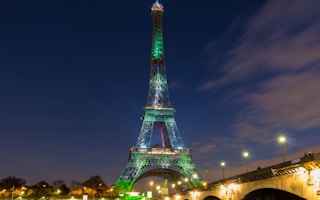The UN climate change conference is “on the cusp” of successfully delivering a global treaty that will help the business community make bold decisions to cut emissions and invest in renewables, said private sector experts on Thursday.
Speaking to the press at Le Bourget in Paris, where policymakers are in the final hours of negotiations, Edward Cameron, managing director, partnership development and research at global non-profit Business for Social Responsibility, said that “over the next 48 hours, there is a choice facing governments”.
They can either agree on a weak but diplomatic outcome or an ambitious agreement that is “catalytic” in its ambition to reduce emissions and support sustainable growth, he said.
The business community came to Paris wanting three key outcomes, said Cameron, who is also policy lead at the We Mean Business coalition, a group of thousands of organisations championing business and policy measures for a transition to a low-carbon economy.
These are: ambitious emissions reductions, a plan to strengthen national climate commitments every five years, and a long-term goal of net-zero global carbon emissions before the end of the century, also known as climate neutrality.
This goal requires zero emissions from all sectors. The World Resources Institute explains that this is achieved first by reducing total emissions to as close to zero as possible, and balancing any remaining greenhouse gases with an equivalent amount of removals such as planting forests or using carbon capture technologies.
Strong targets for emissions cuts will help create a market for low-carbon technologies and other sustainable solutions, explained Cameron.
To a large extent, this ambition has already been delivered in the form of the pledges made by all countries before the start of the conference, he noted. These are known in UN jargon as Intended Nationally Determined Contributions, or INDCs.
While scientists say the INDCs will only limit global temperature rise to 2.7 degrees Celsius - more than the 2 deg C limit recommended by scientists - the world was on course for a warming of 4.8 deg C before the INDCs were submitted, he said.
“A whole new climate economy is created in the space between 4.8 and 2.7 degrees,” he added.
“
(A long-term goal on climate neutrality) provides the confidence to business that our ambition is not dependent on one government, electoral cycle, or a moment in time.
Edward Cameron, managing director, partnership development and research, Business for Social Responsibility
Given the shortcomings in current INDCs, “businesses are also looking for confidence that climate efforts won’t end with Paris but will raise ambition over time,” noted Cameron.
A “review mechanism” being discussed in the text could be the key to this. Once the Paris agreement takes effect in 2020, countries must agree to strengthen their commitments every five years, he said.
“That provides the confidence to business that our ambition is not dependent on one government, electoral cycle, or a moment in time,” he noted.
It also gives multinational corporations which have a presence in many countries the confidence that “their quest for ambition will be honoured no matter where they are.”
Nikki Bartlett, senior program manager and international climate policy expert, Cambridge Institute for Sustainability Leadership & Prince of Wales’s Corporate Leaders Group, added that “the long term goal is fundamental”.
The private sector has called for the global economy to reach net-zero greenhouse gas emissions “as soon as possible, as this clearly says we are decarbonising our economies,” she said.
A target like this would send a clear signal to businesses to invest in low-carbon infrastructure and technologies.
For example, Cameron told Eco-Business that it would encourage a business contemplating a 20-year energy investment today to opt for renewables instead of fossil fuels, which are losing ground among increasingly climate-conscious investors.
But power companies - many of which have been slammed for their heavy investments in fossil fuels and trying to weaken global climate policy - should not view the Paris deal as one intended to put them out of business, said Cameron.
“If you are a smart energy company, you would broaden your portfolio and look at low-carbon energy sources such as renewable and nuclear,” he said. “A climate deal doesn’t have to spell the end of energy companies, but it does mean the progressive phasing out of fossil fuels”.
Ultimately, governments should not hesitate to be ambitious in their goal-setting because businesses are willing to partner with them to deliver the targets needed to avert dangerous climate change, said Damandeep Singh, India director of CDP, formerly known as the Carbon Disclosure Project.
“Make an ambitious and long term commitment, and then pass on the baton to us,” he said. “We will help you implement it”.





















